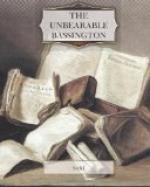sittings were examined and judged the motives and
actions, the motives especially, of the world in general.
In her schoolroom days she had sat in conscientious
judgment on the motives that guided or misguided Charles
and Cromwell and Monck, Wallenstein and Savonarola.
In her present stage she was equally occupied in
examining the political sincerity of the Secretary
for Foreign Affairs, the good-faith of a honey-tongued
but possibly loyal-hearted waiting-maid, and the
disinterestedness of a whole circle of indulgent and
flattering acquaintances. Even more absorbing,
and in her eyes, more urgently necessary, was the task
of dissecting and appraising the characters of the
two young men who were favouring her with their attentions.
And herein lay cause for much thinking and some perturbation.
Youghal, for example, might have baffled a more experienced
observer of human nature. Elaine was too clever
to confound his dandyism with foppishness or self-advertisement.
He admired his own toilet effect in a mirror from
a genuine sense of pleasure in a thing good to look
upon, just as he would feel a sensuous appreciation
of the sight of a well-bred, well-matched, well-turned-out
pair of horses. Behind his careful political
flippancy and cynicism one might also detect a certain
careless sincerity, which would probably in the long
run save him from moderate success, and turn him into
one of the brilliant failures of his day. Beyond
this it was difficult to form an exact appreciation
of Courtenay Youghal, and Elaine, who liked to have
her impressions distinctly labelled and pigeon-holed,
was perpetually scrutinising the outer surface of
his characteristics and utterances, like a baffled
art critic vainly searching beneath the varnish and
scratches of a doubtfully assigned picture for an
enlightening signature. The young man added to
her perplexities by his deliberate policy of never
trying to show himself in a favourable light even
when most anxious to impart a favourable impression.
He preferred that people should hunt for his good
qualities, and merely took very good care that as far
as possible they should never draw blank; even in
the matter of selfishness, which was the anchor-sheet
of his existence, he contrived to be noted, and justly
noted, for doing remarkably unselfish things.
As a ruler he would have been reasonably popular;
as a husband he would probably be unendurable.
Comus was to a certain extent as great a mystification as Youghal, but here Elaine was herself responsible for some of the perplexity which enshrouded his character in her eyes. She had taken more than a passing fancy for the boy—for the boy as he might be, that was to say—and she was desperately unwilling to see him and appraise him as he really was. Thus the mental court of appeal was constantly engaged in examining witnesses as to character, most of whom signally failed to give any testimony which would support the favourable judgment which the tribunal




